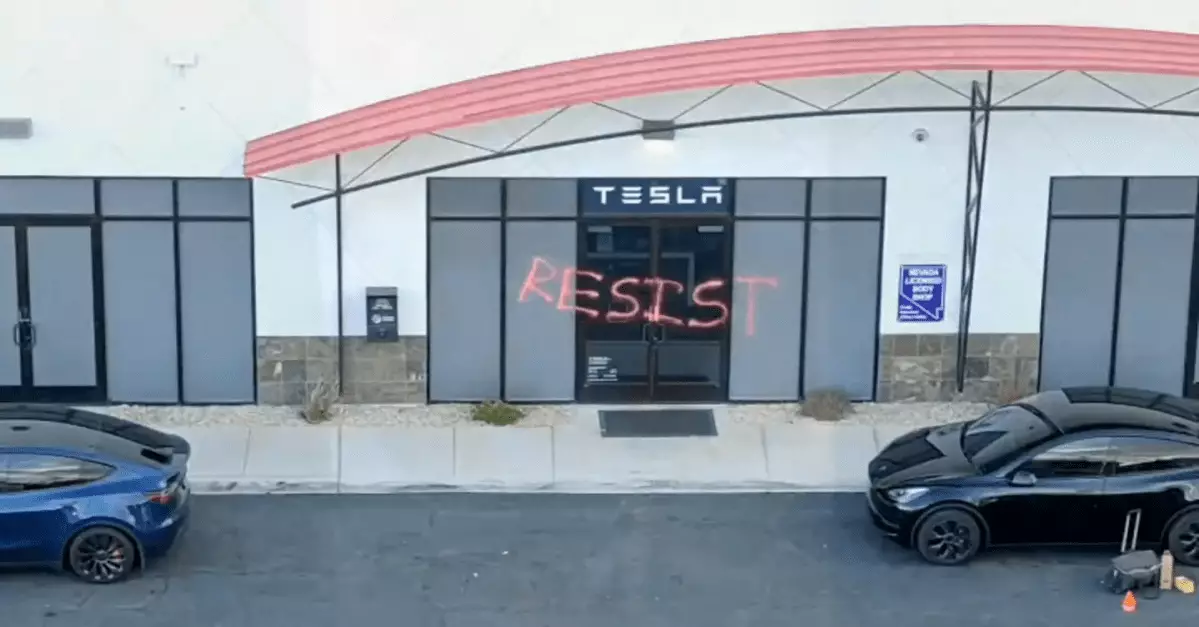As the electric vehicle (EV) market expands, so does the potential for backlash against it. Recent disturbing events involving vandalism and arson against Tesla vehicles highlight an alarming trend that has begun to emerge in society: the targeting of innovative companies by those resistant to change. What was once considered mere vandalism is now being increasingly classified as a serious crime, potentially even domestic terrorism, raising important questions about the implications of such actions for social discourse.
The incidents reported in Las Vegas and Kansas City epitomize this disturbing trend. In a brazen act, an assailant attacked a Tesla center in Las Vegas, employing Molotov cocktails and firearms while defacing property with the word “resist.” This escalation not only showcases a troubling disregard for safety but also points to a grassroots movement that seems to shun the promises of progress and sustainability embodied by electric vehicles. Tesla CEO Elon Musk has vocally condemned these acts as acts of terrorism, a charge that underscores the seriousness with which such vandalism is now viewed.
Fueling a Narrative of Resistance
What fuels an individual’s decision to destroy property that symbolizes majority progress like sustainable transport? The answer lies in a complex mixture of ideology, misinformation, and fear of the unknown amid rapid technological advancement. The motives behind these attacks reveal underlying societal tensions, with certain factions perceiving advanced technology as a threat to traditional values and economic systems. The word “resist” chosen by the attacker in Las Vegas is explicit; it signifies a fierce opposition to change that many stakeholders in society are unable to adapt to.
This environment fosters not only hostility but also ignites further polarization around the topics of climate change and social responsibility. The backlash against EVs appears to be symptomatic of a greater struggle regarding technological advancement and what it means for the future of humanity. It’s a clash between innovation and nostalgia for a bygone era that is rapidly vanishing.
The Response from Law Enforcement and the Community
The gravity of these incidents has prompted law enforcement agencies like the FBI to categorize such actions under the umbrella of terrorism, marking a significant shift in how vandalism is interpreted legally and socially. This categorization signals that society will no longer tolerate destructive behavior aimed at instilling fear and disrupting progress. Local police forces are stepping up their vigilance, responding quickly to reports of fires and safety violations associated with these incidents.
Community conversations are beginning to shift, too. As residents become increasingly aware of the issue, conversations about public safety, technological adoption, and the criminalization of dissent have stirred. While many advocate for peaceful discourse, it’s evident that the fear of the unknown can compel individuals towards destructive actions purportedly meant to protect their interests.
The world of electric mobility finds itself at a watershed moment. Acts of vandalism targeting EVs and companies like Tesla reflect a broader narrative about resistance to social change and innovation. The approach society takes in addressing and discussing these issues will likely shape the future landscape of transport, technology, and the environmental movement. In the face of such challenges, fostering a culture grounded in understanding, education, and positive dialogue could prove to be the most effective antidote to growing tensions.

